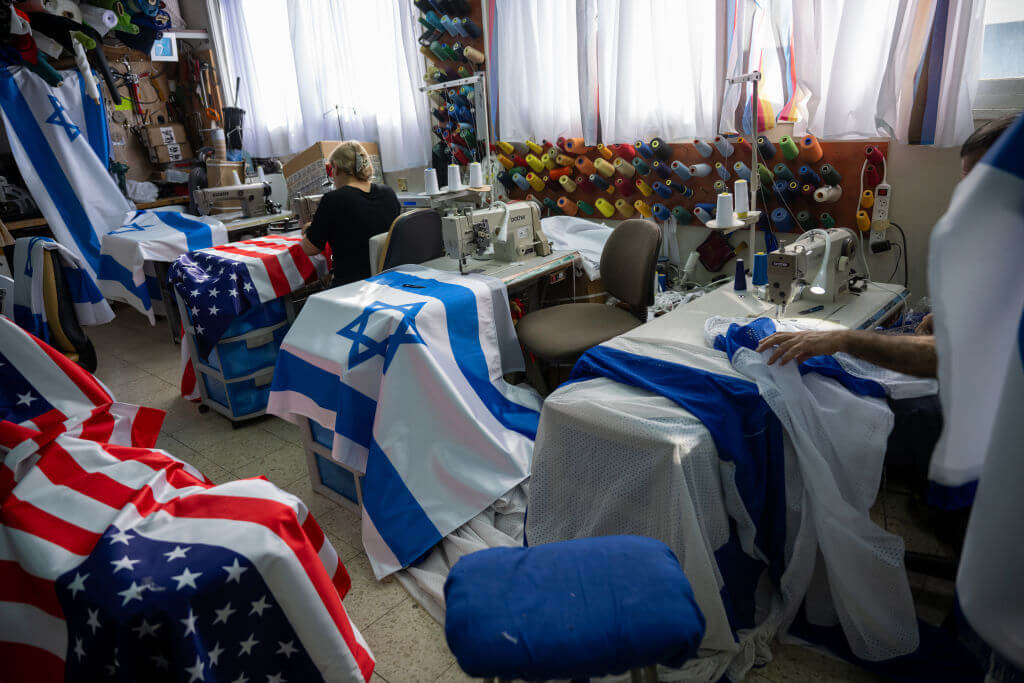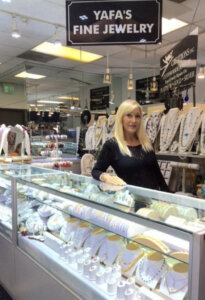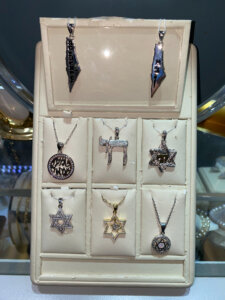Since Oct. 7, Stars of David and Israeli flags have been flying off the shelves
Jews are buying jewelry and other items that reflect their Jewish identity and connection to Israel

A flag factory in Kfar Saba, Israel. Photo by Getty Images
Three days after Hamas attacked Israel, Yafa Black opened her booth, one of dozens at a Florida jewelry market, and quickly sold out of Star of David pendants.
“I called my supplier and said, ‘I don’t know what’s going on,” she said. “I’ve been in business 15 years and I have never seen anything like this. Never.”
Black received a shipment overnight, and the brisk sales of the pendants continued at Yafa’s Fine Jewelry, where the inventory is Jewish and Israel-themed. She estimates that sales have increased by 60% since Oct. 7, and attributes it to an intensified desire of Jews — in sympathy for Israelis and in defiance of rising antisemitism — “to show they are Jewish.”
Interviews with Judaica shop owners, online vendors and manufacturers indicate that Black’s strong sales are part of a wider sales trend. Hamsas, mezuzahs and other Jewish ritual items — and especially items featuring the Star of David, a symbol of Judaism and the Jewish state — have been hard to keep in stock.

Joy Feder, who runs a booth not far from Black’s at the International Jewelry Exchange marketplace in Boca Raton, said her customers have been asking for Star of David necklaces, but understated ones in recognition of Oct. 7 and the war, nothing “too lavish.”
“They want something that is close to their heart,” she said. “They want to wear it to feel united with the state of Israel.”
‘I want everyone to see’
Many American Jews felt their connection to Israel and their Jewish identity deepen after Oct. 7, when Hamas attacked Israel, killing 1,200 and taking 240 hostage — even as some Jews have protested Israel’s retaliatory campaign in Gaza, which has killed more than 30,000, according to Gaza’s health ministry.
Significant increases in antisemitic incidents since the war began have also fortified feelings of solidarity among Jews, prompting them to donate to Jewish and Israel charities, and, according to vendors, wear Judaism’s symbols around their necks and on their lapels.
Israeli-American Yehudit Rossler, of Deerfield Beach, Florida, bought a Star of David pendant last month from an Israeli jewelry designer who was selling them to raise money for the Israel Defense Forces and the hostages.
“I want everyone to see that I’m proud of wearing the Star of David,” said Rossler, an IDF veteran who said she bought it to honor her nephew’s son, Davir Rossler, an Israeli soldier killed by Hamas on Oct. 7 while defending a kibbutz in Southern Israel.

Online retailers are noticing spikes in sales too.
Jackie Olenick, who makes and sells paintings, jewelry and ketubahs, said she sold 30 items in the three months online before Oct. 7. Since then, she has sold about 100, “which for my tiny business is extraordinary,” she said. One piece that’s selling particularly well is a $72 sterling silver heart embedded with a Star of David that “was inspired by the ongoing and tragic war in Israel,” she wrote on her website.
Judaica.com, which describes itself as “the largest and longest-standing comprehensive Jewish gift and shopping website,” did not immediately respond to inquiries.
Judaica sales are increasing despite reports that some Jews are taking pains to appear less conspicuously Jewish. The Anti-Defamation League last month released a survey that found nearly 24% of Americans believed in six or more of 11 Jewish tropes presented to them, up from 20% two years earlier.
Atypical customers
Michael Ebrani of Dinaro Creations in Great Neck, New York, a manufacturer of gold and diamond jewelry, makes a Star of David pendant, and sold about 10 of them a year before Oct. 7. In the months since, he said, he sold 150. There’s a surge in demand for “anything religious that pertains to Israel,” he said. “The demand is much stronger than we expected.”

As with the retailers, the Star of David is his big seller. Hamsas and “evil eye” jewelry are also going fast, “but not anywhere near the sales of the Star of David,” Ebrani said.
Beyond jewelry, Jews are also buying more Jewish items for their homes, said Yitzi Gruen, who owns A Judaica Place in Brooklyn, and said he has seen overall sales at the store rise about 20% since Oct. 7. “Poster, banners, anything with the Jewish symbol on it has become popular,” said Gruen, whose typical customer is an observant Jew.
In the same time period, he has also noticed about a 50% increase in sales to non-religious Jews “who are coming in and actually expressing their pride in being Jewish now.”
And he’s seen a marked increase in Christian customers. Many have come into the store “and expressly told us that they were not religious at all but that they wanted to show solidarity with the Jewish people,” he said. “They said they would like to put up anything that is Jewish on their house. And wow, they are buying mezuzahs.” (But not, he added, the parchment found in traditional mezuzahs, on which passages from Deuteronomy are written.)
Giving back
Some sellers of Judaica and Israeli-themed items are not keeping all the profits for themselves.
Wendy Silver-Gordon, the owner of the online company Traditions Jewish Gifts in Pompano Beach, Florida, created an olive wood mezuzah after Oct. 7, featuring an Israeli flag and Jewish star, for $110. She sold about 60 of them in two months, and is donating all sales to Magen David Adom, Israel’s national ambulance and disaster relief agency.
“We felt it important as a Judaica store to be there not only emotionally but also financially,” Silver-Gordon said. “Many of our vendors are from Israel, and we have long-standing relationships with many small Israeli artists. It was very important to us to give back.”
















